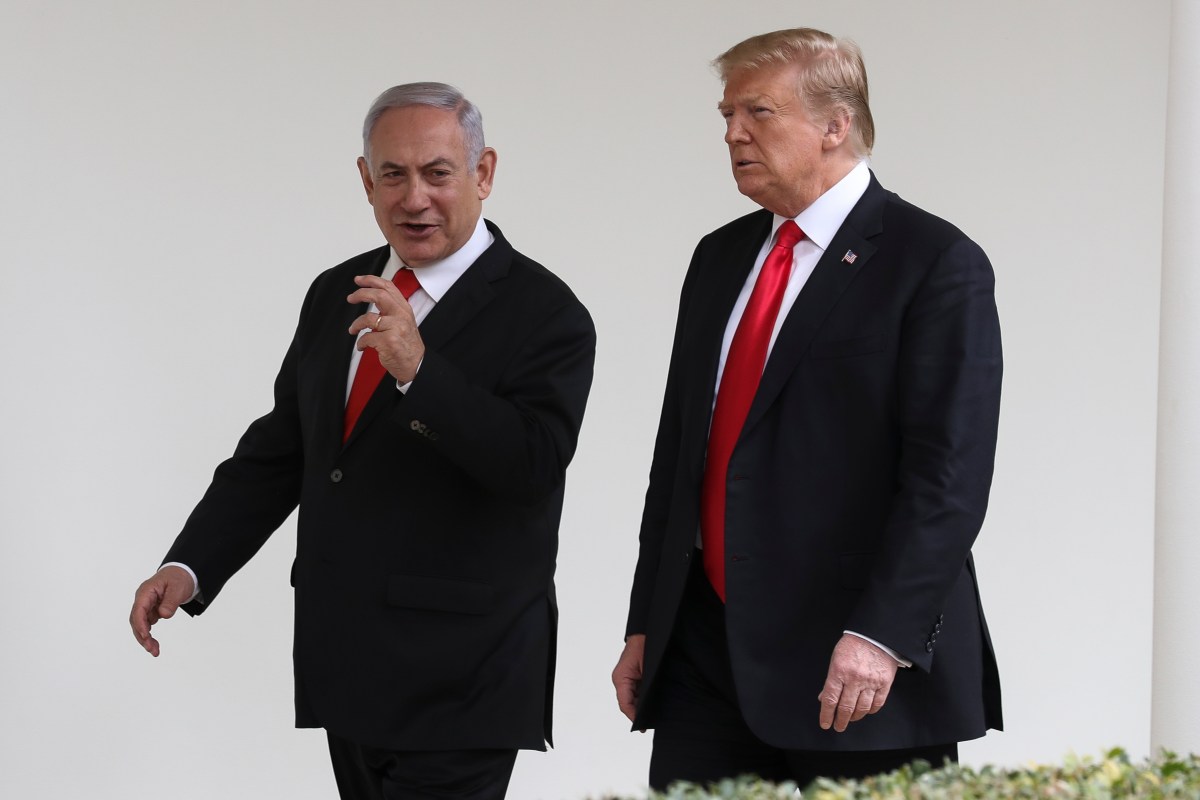On Wednesday, Donald Trump held a rally in West Palm Beach, Florida. Considering Palm Beach County has one of the highest concentrations of Jewish people in America, the typical person at a Trump rally is quite conservative, and Israel is now responding to one of deadliest attacks on its soil in history, I think it’s safe to assume many people in the crowd were supportive of Israel’s right-wing Prime Minister Benjamin Netanyahu.
Yet Trump picked this rally, at this moment, to publicly upbraid Netanyahu.
After saying, “We will stand with Israel 100 percent,” he digressed: “I did have a bad experience with Israel, though, when we took out [Iranian Revolutionary Guards Corps General Qasem] Soleimani” on January 3, 2020.
As he told the story, he said, “I don’t think this has ever been told. They’ll say, ‘Oh, it’s classified information.’ Well, maybe it is, but I don’t think so.”
He said Israel and the U.S. government were “working together” on plans to kill Soleimani before he could launch attacks on American military installations. (In The Divider, Peter Baker and Susan Glasser report that Trump “gave shifting explanations” for the assassination, and that claims of imminent “attacks of four American embassies” were not “backed up in briefings with congressional leaders” by military and intelligence officials.)
But “the night before it happened,” according to Trump, “I got a call that Israel will not be participating in this attack … I said, I don’t like that, that’s not good.”
Trump said he ordered the American military to proceed without Israel. “We did it, but I’ll never forget that Bibi Netanyahu let us down, that was a very terrible thing … We did the job ourself [sic] and it was absolute precision—magnificent, beautiful job. And then Bibi tried to take credit for it … That didn’t make me feel too good.”
This is not the first time Trump has aired his beef with Netanyahu. In an interview conducted by Axios’s Barak Ravid for his book Trump’s Peace, Trump complained that Netanyahu quickly accepted the results of the 2020 election and publicly congratulated Joe Biden: “The first person who congratulated Joe Biden, because this was an election in dispute, it’s still in dispute. The first person who congratulated me was Bibi Netanyahu, the man that I did more for than any other person I dealt with…Bibi could have stayed quiet. He has made a terrible mistake … I haven’t spoken to him since. Fuck him.”
The relationship was strained before the election. In January 2020, after the Soleimani operation, the two announced a “peace” offer to the Palestinians at the White House, involving $50 billion in commercial investment in a new Palestinian state. Netanyahu was eager to burnish his political standing as Israeli elections loomed, so, according to The Divider, he turned the White House ceremony “into a campaign event, speaking from the podium for a full twenty minutes.”
That wasn’t in the script. “Trump did not like anyone stealing his thunder, especially in his own house,” wrote Baker and Glasser.
“’What the hell was that?’ he demanded of his aides afterward. Trump was doing him a favor, the latest of a whole slew of favors, the president told others, and Netanyahu had upstaged him.”
Then Netanyahu said in a subsequent interview that he planned to annex the Jordan Valley and all West Bank settlements. The White House was not informed of those plans. Trump told Ravid, “I got angry, and I stopped it because that was really going too far.” Trump concluded, “I don’t think Bibi ever wanted to make peace.”
Despite their fraught relationship, Trump and Netanyahu forged normalization pacts, known as the Abraham Accords, with several Arab countries. In the summer of 2020, Netanyahu was still aiming to advance his annexation plan, which would have scuttled the possibility of normalization. At one point, a Trump aide told Netanyahu the president would criticize him on Twitter if he moved forward. When Netanyahu expressed incredulity, according to Trump’s Peace, the aide warned him, “The president doesn’t really like you these days.” Eventually, normalization was traded for a three-year pause on annexation.
One of the normalization accords was with Sudan. Trump, Netanyahu, and the leader of Sudan announced the deal via international phone call in late October 2020, days before the US election. Now, it was Trump’s opportunity to turn a ceremony into a campaign event.
“Do you think Sleepy Joe [Biden] could have made this deal, Bibi?” asked Trump, “Sleepy Joe. I think—do think he would had made this deal [sic]? Somehow, I don’t think so.”
Netanyahu didn’t answer directly. “Well, Mr. President, one thing I can tell you is we appreciate the help for peace from anyone in America,” he said. “And we appreciate what you’ve done enormously.” According to Ravid, “Trump bristled.”
Of course, Netanyahu is hardly above criticism. The fact that even Trump thought the Israeli prime minister was insincere about peace is a rare anecdote that puts the former president in a favorable light.
But at the end of the day, every day, Trump makes everything about him. Even when the Middle East is aflame. Even when it makes no political sense. Even when it reveals he is the last person you would want in a position of power during an international crisis, when a real leader must set aside their ego and rally the world around sober, sound, and stabilizing policies.



